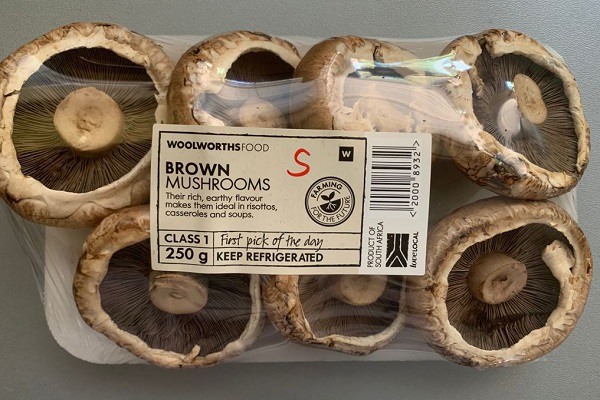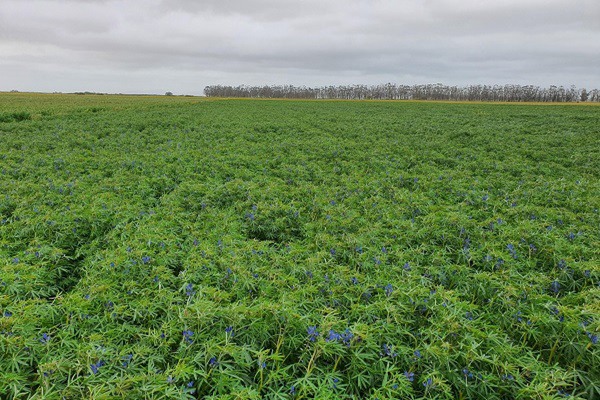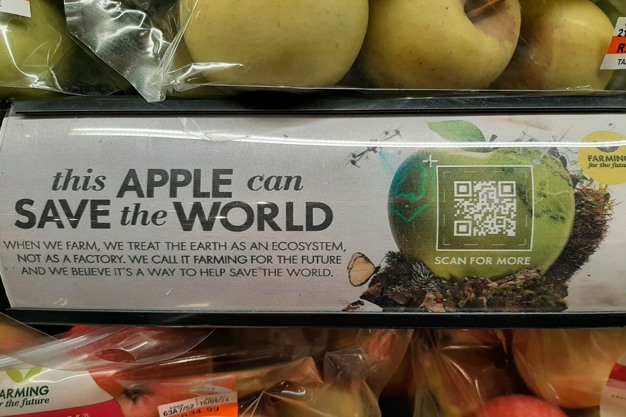Consumers love a good story but they're wary of greenwashing, notes Kobus Pienaar, programme manager of the Woolworths Farming for the Future programme, designed to offer their customers evidence of the mindfulness with which their fruit and vegetables are grown. "We like explaining to customers that their shopping habits drive behaviour in the value chain," he says. "When price is the only factor, it may be to their detriment and to the detriment of the environment as well as of the workers on the farm where the food was grown."
Carrying the flag for Farming for the Future
Apples, lettuce and mushrooms have been chosen as the flagship lines for the Farming for the Future campaign, buttressed by two principles: to address chronic low-level exposure to synthetic chemicals and to cease the repeat use of active ingredients to which pests become immune.

And since Woolworths needs to think of how they will stock their shelves decades from now, they are also putting out the question: "Will your farm still be there in future with diverse ecosystem services, or will it be impossible to farm due the irresponsible use of agriculture inputs in years gone by?"
These concerns have been on the minds of Woolworths' technical team since 2004, when Pienaar was first appointed lead on the project. On around 800 farms in South Africa and Mozambique, fresh produce and flowers are today grown in a way that reflects the Farming for the Future ethos: instead of merely treating the symptom, farmers are opting to identify and eliminate the cause of poor plant health and yields.
"This is not your usual certification scheme. You cannot fail the programme, you are only measured against your own starting point. We want to go to the farmer who has overused synthetic inputs and introduce them to the wonderful world of biological and organic inputs," Pienaar says. At the end of it, he adds, a Farming for the Future farm will be in a very good place.

Lupine cover crop on a Farming for the Future participant farm
Concerns raised by chronic, low-level exposure to synthetic pesticides
Tom Murray, Woolworths' technical manager for fruit, knows to clarify that the Farming for the Future programme is not maligning synthetic chemicals per se, but he strongly advises farmers to ask their chemical representatives for proof of the efficacy of their products.
"We want to save synthetic chemicals that are good and valuable to us, while easing out those that are hazardous," Murray says, pointing out that South Africa still has 192 highly hazardous pesticides (HHP) in legal use, while only thirty HHP are totally banned. He includes organophosphates among those that are highly hazardous and for which, in his opinion, there is no place in agriculture.
Woolworths have not placed an outright ban on any currently registered pesticides within the Farming for the Future programme, Pienaar explains, but their approach desists from employing pesticides as a first line of defense. "Because of mounting resistance and the negative impact on beneficial organisms, plus the effect on farm workers, there are far better products than your traditional, synthetic pest control inputs."

The message to consumers is that support of Farming for the Future produce is a vote for regenerative farming practices
Eleven years hence Woolworths wants zero residues on fresh produce
One of the main expenses in the programme is the collection of test samples from each farmer and all through the growing season and upon harvesting, samples are sent to laboratories in Spain to be tested for residue levels of synthetic chemicals and heavy metals.
"Farmers have to tell us everything and we then correlate it with the test results," Pienaar says. "Transparency and integrity are key to Farming for the Future, and our processes ensure there is no place to hide."
He says it's been years since they picked up any excessive residues on fruit, adding that they are working with farmers of integrity. "We're not working with farmers who would, for example, stockpile banned ingredients. That's not a Woolworths farmer."
While test results for fruit have been clear, vegetables and salads face a different set of challenges. Vegetable crops like tomatoes, peppers and kale are more complex because of how attractive they are to a wide range of aggressive pests and diseases.
Despite these challenges, in the last year, over 250 tests were conducted on vegetables and salads in the Farming for the Future programme, of which 40% had zero residues. This was an exceptional result that thrilled Pienaar and his colleagues. The remaining samples were largely below the legal limits, and by 2030 Woolworths would like to find no more than two residues on a sample and five years later, in 2035, none at all.
Resistance red flags
A zest for testing has shown up something else: mounting pesticide resistance – not only among pests of fruit and vegetables, but also among those of stored grains. Murray remarks that booklice-infested rice was recently recalled; a direct impact of years of incorrect application of the same, limited pesticidal bouquet.
Alarming signs of fungicide resistance have been evident too - even on products where, they believe, resistance ought not to be occurring.
"Resistance and the irresponsible use of active ingredients means farmers are running out of options," Pienaar asserts. "This reality is going to force farmers at adopt a preventative mindset, a mindset we already consider second nature in the Farming for the Future programme."
They would like their consumers to know that supporting Farming for the Future is a vote for regenerative farming practices, prioritising organic and biological inputs while reducing a reliance on chemical additives.
"After all," Pienaar observes, "the prosperity of the land on which farmers grow is at stake. While it's not always possible to do everything perfectly, what counts is the intent to get it right." For more information:
For more information:
Kobus Pienaar
Farming For The Future
Email: kobuspienaar@woolworths.co.za
https://www.woolworths.co.za

